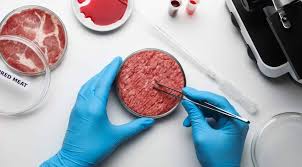
Cultured meat is real animal meat produced by growing animal cells in a laboratory setting, eliminating the need to raise and slaughter animals. This process involves taking a small biopsy of cells, cultivating them in a nutrient-rich environment, and then processing them to create meat that is nutritionally comparable to conventional meat but produced more humanely and with a potentially lower environmental impact.
How it’s made
- Biopsy: A small sample of animal cells is taken from a living animal.
- Cell banking: The cells are banked and stored for future use.
- Cell growth: Cells are multiplied in a bioreactor, fed a nutrient-rich growth medium, and encouraged to form muscle and other tissues.
- Harvesting: The resulting biomass is harvested.
- Food processing: The harvested tissue is processed into final products like burgers, nuggets, or other food items, often by combining it with other ingredients to achieve the desired taste and texture.
Potential benefits
- Animal welfare: It avoids the slaughter of animals for meat production.
- Environmental impact: It could significantly reduce the environmental impact of livestock farming, such as greenhouse gas emissions and land and water use.
- Health: It may be produced without antibiotics, hormones, or steroids, and its nutritional profile could potentially be customized.
- Food security: It offers a new way to produce protein to meet growing global demand.
Challenges and considerations
- Cost: The production process is currently expensive, and it is not yet clear when it will be cost-competitive with traditional meat.
- Scalability: Scaling up production to meet consumer demand is a major challenge.
- Consumer acceptance: Some consumers may have ethical concerns or find the high-tech nature of the production process unappealing.
- Long-term health effects: More research is needed on the long-term health effects of consuming cultured meat.
- Availability: The availability of cultured meat is still limited, with only a few companies authorized to sell it in certain markets.
